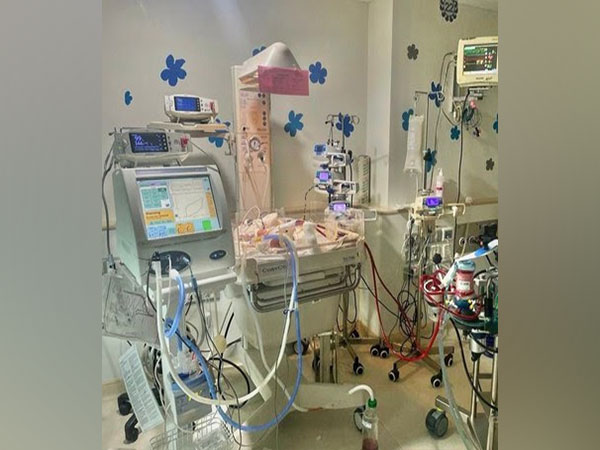Manipal Hospital Old Airport Road successfully carried out bedside ECMO in Neonatal ICU, saves smallest low birth weight Newborn Baby
In the first such report inside a NICU in India, Manipal Hospital, Old Airport Road, Bangalore successfully carried out an emergency ECMO in a very small low birth-weight neonate (1.7 Kg) who suffered from a life-endangering condition of pulmonary hypertension and haemorrhage which lead to multi-organ dysfunction and cardiorespiratory failure.

- Country:
- India
Bangalore (Karnataka) [India], December 16 (ANI/PRNewswire): In the first such report inside a NICU in India, Manipal Hospital, Old Airport Road, Bangalore successfully carried out an emergency ECMO in a very small low birth-weight neonate (1.7 Kg) who suffered from a life-endangering condition of pulmonary hypertension and haemorrhage which lead to multi-organ dysfunction and cardiorespiratory failure. Dr Karthik Nagesh, Chairman- HOD and Consultant - Neonatology-NICUs, Manipal Hospital Old Airport Road, Bangalore, and the Cardiac team of doctors led by Dr Devananda N S, Head & Consultant - Cardiothoracic Vascular Surgery and Dr Lalchand, Consultant - Cardiothoracic Vascular Surgery at Manipal Hospital Old Airport Road, Bangalore in the Neonatal Intensive Care Unit treated the child with the initiation of veno-arterial ECMO followed by a successful surgery by the Cardiac Surgery team for a problem called large patent ductus arteriosus.
The newborn girl initially presented with breathing problems (rapid and shallow breathing) along with which her heart was beating fast (over 100/min). Her skin also turned pale or bluish due to decreased oxygen in the body. She was referred from a local hospital on day 6 of birth as she was unresponsive to conventional ventilation and medical therapy. On admission, she was found to have a large patent ductus arteriosus, meaning the persistent opening between the aorta and pulmonary artery which leads to severe pulmonary arterial hypertension causing extra blood to flow to the lungs.
Treatment for severe pulmonary hypertension was initiated at the earliest. Even though her pulmonary pressures were reduced, her condition worsened to the extent that she developed a pulmonary haemorrhage (bleeding from the lungs) and acute cardiorespiratory failure. On day 17, in view of severe life endangering condition it was assessed by the treating teams that starting immediate peripheral veno-arterial ECMO straightaway in the NICU at the bedside could only save her life. A closed heart surgery called PDA ligation was also performed subsequently while the baby was still on ECMO support. She not only tolerated the next critical 120 hours of continuous ECMO but also showed gradual improvement with no major complications. She was extubated to nasal CPAP on day 24 and was finally weaned off to room air on day 32 of birth. The baby was followed up in the outpatient department after discharge and is stable.
Dr Karthik Nagesh explains, "This is the first such Indian experience inside a Neonatal ICU and I think we have shown the remarkable effectiveness of ECMO in treating critical neonates not responding to conventional treatment. However, while treating pulmonary hypertension with pulmonary vasodilators, the possibility of pulmonary edema via ductus has to be kept in mind. This case is a clear indication that early and aggressive use of ECMO can help reduce neonatal mortality even in the smallest of neonates." Neonatal extracorporeal membrane oxygenation (ECMO) is an advanced technically challenging but potentially life-saving procedure for critically ill neonates suffering from a possible reversible disease that has caused severe cardiac and/or respiratory failure and is refractory to maximal conventional management being given. It can be used in the treatment of neonates with a variety of reversible cardio-respiratory problems.
"Veno-arterial (VA) ECMO is necessary when a patient is in cardiac failure. Although 2 kg is generally considered to be the lower limit for doing ECMO, infants smaller do also need this life-saving support. But there is hesitation as it's an intricate procedure and has not been tried much in neonates who weigh lesser than 2 kg. In this case, the dexterity of the surgical technique using an appropriate-sized small cannula was important in the successful ECMO,"says Dr Karthik Nagesh. While on ECMO, the main challenge is to monitor and treat the neonate for common complications like coagulopathy, hypertension, and bleeding at the cannulation site and to avoid dreaded intracranial haemorrahge and ischemia for a better outcome. With adequate expertise and resources, peripheral VA-ECMO can be used bedside and aid in survival of critical neonates with cardiorespiratory failure not responding to conventional treatment. More and more advanced NICUs in India can arrange additional ECMO facilities and thus offer more help to reduce neonatal mortality.
As a pioneer in healthcare, Manipal Hospitals is among the top healthcare providers in India serving over 4 million patients annually. Its focus is to develop an affordable, high-quality healthcare framework through its multispecialty and tertiary care delivery spectrum and further extend it to out-of-hospital care. With the completion of the acquisition of 100 per cent shareholding in Columbia Asia Hospitals Private Limited and Vikram Hospital (Bengaluru) Private Limited, the integrated network today has a Pan-India footprint of 27 hospitals across 15 cities with 7,600+ beds, and a talented pool of 4,000 doctors and an employee strength of over 11,000.
Manipal Hospitals provide comprehensive curative and preventive care for a multitude of patients from around the globe. Manipal Hospitals is NABH, and AAHRPP accredited and most of the hospitals in its network are NABL, ER, and Blood Bank accredited and recognized for Nursing Excellence. Manipal Hospitals has also been recognized as the most respected and patient-recommended hospital in India through various consumer surveys. This story is provided by PRNewswire. ANI will not be responsible in any way for the content of this article. (ANI/PRNewswire)
(This story has not been edited by Devdiscourse staff and is auto-generated from a syndicated feed.)









